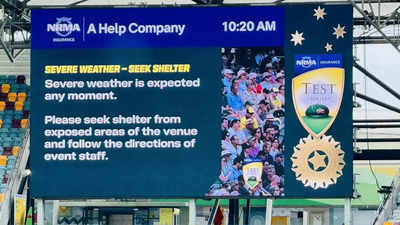
The third Test between India and Australia at the Gabba in Brisbane continued to be affected by rain, but it was lightening and thunder that forced play to be suspended on Wednesday before rain arrived on the final morning of the match.
It took Australia just eight balls to snare the last Indian wicket after the pair of Jasprit Bumrah (10*) and Akash Deep (31) frustrated them on Tuesday evening with their last-wicket partnership that helped India save the follow-on.
Travis Head dismissed Akash with his off-spin to end the partnership of 47 runs and wrap up India’s first innings at 260, which gave Australia a lead of 185 runs. But with India saving the follow-on and rain washing out the remainder of the first session, the game is on its way to end in a draw.
KL Rahul Press Conference
The Indian team was ready to come out and bowl, but they were asked to go back after a flash of lightning appeared in the dark skies.
It’s not often that lightning and thunder force the umpires to stop play, but rules have been put in place by the International Cricket Council if there is a threat of a lightning-strike.
Former international umpire Simon Taufel explained that on the Channel 7 broadcast for the knowledge of the fans.
“The ICC have had a lightning protocol in place for a number of years now, probably five to six years. It’s a 30:30 rule,” said Taufel.
“So when there’s an imminent threat of lightning and the umpires see a flash of lightning, if they hear a thunder clap within 30 seconds, that’s the guideline for them to suspend play or not play at all.
“Obviously there’s a degree of common sense here that if the storm is moving away, and that 30 seconds is getting close, they can agree to restart play or keep playing,” he added.
Taufel further said that in case of this particular instance at the Gabba on Wednesday, the lightning appeared close and was threatening.
“In this particular case, with lightning so close, there is an imminent threat; and when they see a flash of lightning and a clap of thunder within 30 seconds, they will suspend and abandon play because it is about the safety of everyone, spectators included, ground staff and everyone at the ground.”
The five-Test Border Gavaskar Trophy series is currently level at 1-1, with India winning the first Test in Perth by 295 runs and Australia coming back with a 10-wicket victory at the Adelaide Oval.
The third Test will begin on Boxing Day, December 26, at the Melbourne Cricket Ground.




